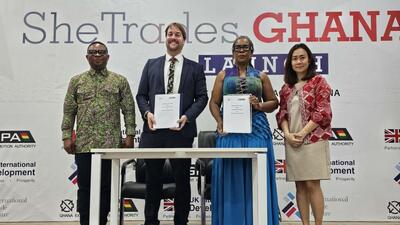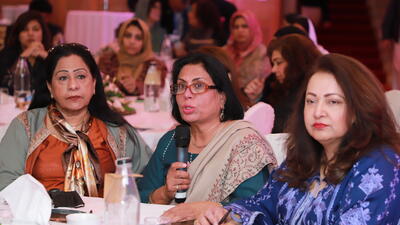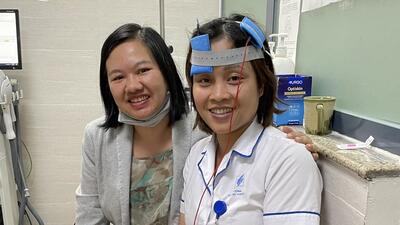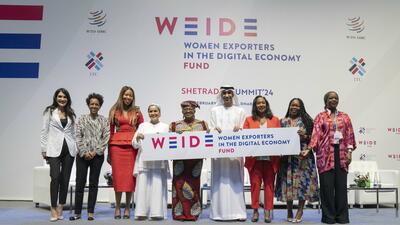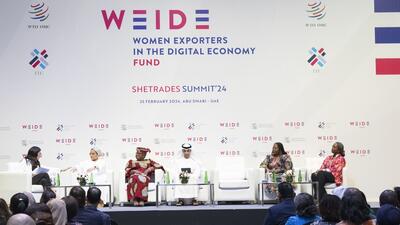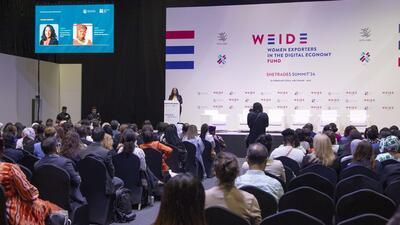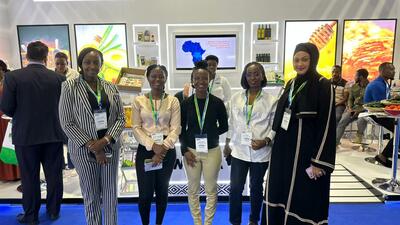
International Trade Centre launches a groundbreaking tool to track policies for women in trade
SheTrades Outlook enables governments and others to track progress on gender equality in trade
(New York) - The International Trade Centre today announced the launch of SheTrades Outlook, a digital tool that allows governments and others to track progress on gender equality in trade, and progress toward achieving Sustainable Development Goal 5 to empower all women and girls.
SheTrades Outlook provides quantitative and qualitative data using 83 indicators across six policy areas. It contains more than 50 good-practice examples to spur policymakers worldwide to introduce and reform policies that support women in trade. These include Bangladesh's use of digital technologies to empower entrepreneurship for rural women, Canada's gender-based analysis of trade agreements, and Lesotho's grants to support women in the creative industries.
Funded by the United Kingdom, the project aims to increase the competitiveness of women-owned businesses in international trade, including by improving the policy environment. According to the innovative digital tool, South Africa, Mauritius, Rwanda, and Samoa are among the countries that have designed leading policies that boost women's economic empowerment.
'Africa has the highest concentration of female entrepreneurs in the world, but many have not yet realised their full potential,' said UK Minister for Africa James Duddridge.
'This great, new tool will help women globally reap the benefits of trade, bringing economic benefits to their families and communities, as we help the developing world build back better after coronavirus,' he said
ITC's acting Executive Director, Dorothy Tembo, said: 'With the SheTrades Outlook, ITC is contributing to making big data work for inclusive trade. The tool helps overcome a long-standing barrier to making trade policies work for women - the lack of quality data.'
She added: 'Better collection and analysis of data on women in trade enables policymakers to build more gender-just economies and boost progress in achieving Sustainable Development Goal 5 on empowering all women and girls.'
The tool tracks how laws, policies and practices affect women's participation in business and trade. It enables comparison across countries and sharing of good practices in Trade Policy, Business Environment, Legal and Regulatory Frameworks, Access to Finance, Access to Skills and Work and Society.
SheTrades Outlook is based on women-in-trade data − 80% of which has never been collected before - from more than 500 government institutions and private sector organizations. The tool is set to be rolled out globally after launching with coverage of 25 countries.
ITC developed SheTrades Outlook as part of SheTrades in the Commonwealth, a dedicated project under the ITC SheTrades Initiative, launched in April 2018.
The SheTrades Outlook, available at www.shetrades.com, gives policymakers access to step-by-step guides that enable them to develop free trade agreements, trade policies and public procurement policies that are more responsive to women's needs.
ITC launched the SheTrades Outlook at a side event of the United Nation's High-Level Political Forum on Sustainable Development held in New York.
Speakers at the event included Ms. Paula Gopee-Scoon, Minister of Trade and Industry, Republic of Trinidad and Tobago; Mr. Tipu Munshi, Minister of Commerce, People's Republic of Bangladesh; Pauline Tallen, Minister of Women Affairs and Social Development, Federal Republic of Nigeria; James Duddridge, UK Minister for Africa.
SheTrades Outlook − Key Facts
1. What is SheTrades Outlook?
- It is a first-of-its-kind online tool aimed at empowering women to trade.
- The tool aims to create a complete picture of women's participation in trade and promote evidence-based policymaking by providing both quantitative and qualitative data on six topics.
- It includes 83 indicators across six topics (or pillars): Trade Policy, Business Environment, Legal and Regulatory Frameworks, Access to Finance, Access to Skills and Work and Society.
- It includes resources for women entrepreneurs, business support organizations and policymakers.
- Examples of good practice show how individual countries have addressed barriers that women face through highlighting national initiatives, policies or programmes that focus on achievements, impact, and challenges.
2. How can you use SheTrades Outlook?
- By selecting a country, you can see how supportive the overall policy ecosystem for women in trade is in that country.
- You can see how well a country is doing, or where it needs to improve, by clicking on each of the six pillars, which provides details of indicators and sub-indicators.
- You can compare countries and regional/economic groupings.
- You can compare pillars or examine pillars in detail, as well as adjust the weight attached to each pillar or indicator.
- You can search for good practices by country or topic to allow for the exchange of experiences and lessons learnt.
- You can download data on the institutions interviewed and additional information on the country profile pages.
3. Who benefits from using SheTrades Outlook?
- Countries can build a complete picture of how well they are supporting women's participation in trade.
- Funders can identify areas for technical support.
- Civil society and women's organizations can use it to advance advocacy.
- Corporate and financial institutions can use it to shape their women's economic empowerment programmes.
About the SheTrades Initiative
SheTrades aims to connect three million women to international markets by 2021. The initiative works with governments, corporations, and business support organizations across seven global actions to unlock markets for women to trade. SheTrades also enables women entrepreneurs to connect with buyers, investors, events, and market opportunities through its digital platform.
SheTrades in the Commonwealth aims to deliver training, strengthening, and mentoring activities to 3,000 women-owned businesses in Bangladesh, Ghana, Kenya, and Nigeria as well as to provide Commonwealth-wide support to governments through advisory services and tools that encourage more gender-responsive trade and trade-related policies. It is funded by the United Kingdom's Department for International Development (DFID).
Notes for the Editor
About ITC - The International Trade Centre is the joint agency of the World Trade Organization and the United Nations. ITC assists small and medium-sized enterprises in developing and transition economies to become more competitive in global markets, thereby contributing to sustainable economic development within the frameworks of the Aid-for-Trade agenda and the United Nations' Sustainable Development Goals. For more information, visit www.intracen.org.
Follow ITC on Twitter | Facebook | LinkedIn | Instagram | Flickr
Jarle Hetland, Media Officer International Trade Centre P: + 41 22 730 0145 M: + 41 79 582 9180 E: hetland [at] intracen.org (hetland[at]intracen[dot]org) |
|






